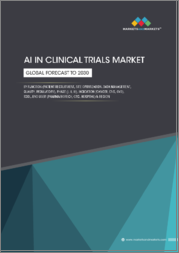
|
시장보고서
상품코드
1535897
임상시험용 AI 시장 규모 : 컴포넌트별, 기술별, 용도별, 최종 사용자별 예측(2024-2032년)AI in Clinical Trials Market Size - By Component (Software, Service), By Technology (Machine Learning (ML), Natural Language Processing (NLP), Computer Vision, Contextual Bots), By Application, By End User & Forecast, 2024 - 2032 |
||||||
세계의 임상시험용 AI 시장 규모는 AI 기술과 맞춤형 의료의 지속적인 진보로 2024년부터 2032년 사이에 14%의 연평균 복합 성장률(CAGR)에 이를 전망입니다.
AI 알고리즘을 강화하면 보다 정확한 데이터 분석, 보다 신속한 의약품 개발 및 테스트 효율성 향상이 가능합니다. 또한, 개인화된 의료의 시작은 개별 환자 데이터를 기반으로 맞춤형 치료 계획을 가능하게 하고 치료 성적을 최적화합니다. 인공지능 기술이 진화하고 개별화 접근법이 보급됨에 따라 이러한 복합적인 영향으로 임상시험이 가속화되고 효율적이고 효과적인 시장이 확대됩니다.
예를 들어, 2023년 11월, AstraZeneca는 임상시험에 AI와 디지털 헬스 솔루션을 통합하는 Evinova를 발표하고, CRO, 임상 의뢰자, 케어팀, 환자를 타겟으로 하고, 이 회사가 이미 세계에서 사용하고 있는 기술 를 활용했습니다. 이 움직임은 임상 연구에 첨단 기술을 통합하고, 혁신을 촉진하고, 시험 결과를 개선하며, 시장 도입을 확대할 수 있는 추세 증가를 보여줍니다. AstraZeneca와 같은 대기업이 AI를 채택하는 것은 임상시험의 과정과 결과를 변화시키는데 AI의 역할이 확대되고 있음을 강조하고 있습니다.
임상시험용 AI 산업은 컴포넌트, 기술, 용도, 최종 사용자, 지역에 따라 세분화됩니다.
머신러닝 부문은 2024-2032년을 통해 상당한 성장을 나타냅니다. 머신러닝 알고리즘은 엄청난 임상 데이터 처리, 패턴 식별 및 테스트 결과 예측에 매우 중요한 역할을 합니다. 이러한 기능은 데이터 분석에 소요되는 시간을 크게 단축하고 의사 결정의 정확성을 높입니다. 제약 회사는 환자 선택 최적화, 임상시험 진행 상황 모니터링, 규제 기준 준수를 보장하기 위해 머신러닝을 활용합니다. 임상시험에서 머신러닝의 통합은 효율성을 향상시키고 전체 시험의 질을 향상시키고 시장 확대를 지원합니다.
의약품 부문은 의약품 개발 프로세스의 가속화에 있어 변혁적 영향으로 인해 2032년까지 상당한 이익을 얻습니다. AI 기술은 예측 모델링을 강화하고, 임상시험 설계를 최적화하고, 잠재적인 신약 후보를 보다 효율적으로 파악함으로써 시간과 비용을 대폭 절감합니다. 고급 알고리즘이 엄청난 데이터 세트를 분석하고 새로운 약물 상호 작용과 바이오 마커를 발견함으로써보다 치밀한 치료가 가능합니다. 제약회사는 창약을 합리화하고 성공률을 향상시키는 AI를 점점 채용하고 있으며, 이 분야는 나름 시장 점유율을 차지할 것으로 보입니다.
아시아태평양의 임상시험용 AI 시장은 2024년부터 2032년까지 완만한 CAGR을 달성합니다. 이 지역에서는 의료 인프라가 급속히 발전하고 의학 연구에 대한 투자가 증가하고 정부 지원 정책이 AI 도입에 도움이되는 환경을 조성하고 있습니다. 중국, 인도, 일본 등의 국가들은 의료성과를 개선하고 만성질환 부담 증가에 대처할 필요성으로 인공지능기술을 임상시험에 통합하는 최전선에 있습니다. 대규모 환자 집단의 존재와 첨단 기술 솔루션의 가용성은 아시아태평양의 임상시험용 AI 산업의 확대를 더욱 강화하고 있습니다.
목차
제1장 조사 방법과 조사 범위
제2장 주요 요약
제3장 업계 인사이트
- 생태계 분석
- 공급자의 상황
- 플랫폼 제공업체
- 소프트웨어 제공업체
- 서비스 제공업체
- 유통 채널
- 최종 사용자
- 이익률 분석
- 테크놀로지, 이노베이션, 정세
- 특허 분석
- 주요 뉴스
- 규제 상황
- 영향요인
- 성장 촉진요인
- 신약 개발·발견의 가속
- 환자 모집 개선
- 데이터 분석과 실시간 모니터링 강화
- 맞춤형 의료의 필요성 증가
- 업계의 잠재적 위험 및 과제
- 데이터 프라이버시 및 보안에 대한 우려
- 기존 시스템과의 통합
- 성장 촉진요인
- 성장 가능성 분석
- Porter's Five Forces 분석
- PESTEL 분석
제4장 경쟁 구도
- 소개
- 기업 점유율 분석
- 경쟁 포지셔닝 매트릭스
- 전략 전망 매트릭스
제5장 시장 추계·예측 : 컴포넌트별, 2021-2032년
- 주요 동향
- 소프트웨어
- 페이즈 I
- 페이즈 II
- 페이즈 III
- 서비스
- 페이즈 I
- 페이즈 II
- 페이즈 III
제6장 시장 추계·예측 : 기술별, 2021-2032년
- 주요 동향
- 머신러닝
- 자연언어처리(NLP)
- 컴퓨터 비전
- 문맥 봇
- 기타
제7장 시장 추계·예측 : 용도별, 2021-2032년
- 주요 동향
- 의약품 개발
- 창약
- 임상시험관리
- 환자 모집
- 임상시험 모니터링
- 임상 데이터 관리
- 리스크 기반 모니터링
- 기타
제8장 시장 추계·예측 : 최종사용자별, 2021-2032년
- 주요 동향
- 제약 기업 및 생명 공학 기업
- CRO(의약품 개발 업무 수탁 기관)
- 학술기관 및 연구기관
- 기타
제9장 시장 추계·예측 : 지역별, 2021-2032년
- 주요 동향
- 북미
- 미국
- 캐나다
- 유럽
- 영국
- 독일
- 프랑스
- 이탈리아
- 스페인
- 러시아
- 북유럽
- 기타 유럽
- 아시아태평양
- 중국
- 인도
- 일본
- 호주
- 한국
- 동남아시아
- 기타 아시아태평양
- 라틴아메리카
- 브라질
- 멕시코
- 아르헨티나
- 기타 라틴아메리카
- 중동 및 아프리카
- UAE
- 남아프리카
- 사우디아라비아
- 기타 중동 및 아프리카
제10장 기업 프로파일
- BenevolentAI Ltd.
- ConcertAI, Inc.
- Exscientia Ltd.
- GNS Healthcare
- Halo Health Systems
- IBM(International Business Machines Corporation)
- Insilico Medicine, Inc.
- IQVIA Holdings Inc.
- Medidata Solutions, Inc.
- Nuance Communications, Inc.
- Numerate
- NVIDIA Corporation
- Owkin Inc.
- Parexel International Corporation
- Prometheus Biosciences Inc.
- Renalytix AI plc
- ReviveMed Ltd.
- Saama Technologies, Inc.
- Sensyne Health plc
- TrialTrove Inc.
Global AI in Clinical Trials Market size will capture a 14% CAGR between 2024 and 2032, driven by continuous advancements in AI technologies and personalized medicine. Enhanced AI algorithms enable more accurate data analysis, faster drug development, and improved trial efficiency. Also, the rise of personalized medicine allows for tailored treatment plans based on individual patient data, optimizing therapeutic outcomes. As AI technologies evolve and personalized approaches become more prevalent, their combined impact will accelerate clinical trials, making them more efficient and effective, thereby expanding the market.
For instance, in November 2023, AstraZeneca introduced Evinova to integrate AI and digital health solutions into clinical trials, targeting CROs, trial sponsors, care teams, and patients, leveraging technologies already used globally by the company. This move indicates a rising trend towards integrating advanced technologies in clinical research, driving innovation, improving trial outcomes, and potentially increasing market adoption. As major players like AstraZeneca adopt AI, it underscores the expanding role of AI in transforming clinical trial processes and outcomes.
The AI in clinical trials industry is segmented based on component, technology, application, end-user, and region.
The machine learning segment will witness substantial growth throughout 2024-2032. Machine learning algorithms play a pivotal role in processing vast amounts of clinical data, identifying patterns, and predicting trial outcomes. These capabilities significantly reduce the time required for data analysis and enhance decision-making accuracy. Pharmaceutical companies are increasingly leveraging machine learning to optimize patient selection, monitor trial progress, and ensure compliance with regulatory standards. The integration of machine learning in clinical trials improves efficiency and enhances the overall quality of trials, supporting market expansion.
The drug discovery segment will amass considerable gains by 2032, attributed to its transformative impact on accelerating drug development processes. AI technologies enhance predictive modeling, optimize clinical trial designs, and identify potential drug candidates more efficiently, considerably reducing time and costs. Advanced algorithms analyze vast datasets to uncover novel drug interactions and biomarkers, leading to more targeted therapies. As pharmaceutical companies increasingly adopt AI for its ability to streamline discovery and improve success rates, this segment will hold a decent market share.
Asia Pacific AI in clinical trials market will achieve a moderate CAGR from 2024 to 2032. The region's rapidly evolving healthcare infrastructure, increasing investment in medical research, and supportive government policies create a conducive environment for AI adoption. Countries like China, India, and Japan are at the forefront of integrating AI technologies into clinical trials, driven by the need to improve healthcare outcomes and address the growing burden of chronic diseases. The presence of a large patient population and the availability of advanced technological solutions further support the expansion of the Asia Pacific AI in clinical trials industry.
Table of Contents
Chapter 1 Methodology & Scope
- 1.1 Market scope & definition
- 1.2 Research design
- 1.2.1 Research approach
- 1.2.2 Data collection methods
- 1.3 Base estimates & calculations
- 1.3.1 Base year calculation
- 1.3.2 Key trends for market estimation
- 1.4 Forecast model
- 1.5 Primary research and validation
- 1.5.1 Primary sources
- 1.5.2 Data mining sources
Chapter 2 Executive Summary
- 2.1 Industry360°synopsis, 2021 - 2032
Chapter 3 Industry Insights
- 3.1 Industry ecosystem analysis
- 3.2 Supplier landscape
- 3.2.1 Platform provider
- 3.2.2 Software provider
- 3.2.3 Service provider
- 3.2.4 Distribution channel
- 3.2.5 End user
- 3.3 Profit margin analysis
- 3.4 Technology & innovation landscape
- 3.5 Patent analysis
- 3.6 Key news & initiatives
- 3.7 Regulatory landscape
- 3.8 Impact forces
- 3.8.1 Growth drivers
- 3.8.1.1 Accelerated drug development and discovery
- 3.8.1.2 Improved patient recruitment
- 3.8.1.3 Enhanced data analysis and real time monitoring
- 3.8.1.4 Rising need of personalized medicine
- 3.8.2 Industry pitfalls & challenges
- 3.8.2.1 Data privacy and security concerns
- 3.8.2.2 Integration with existing systems
- 3.8.1 Growth drivers
- 3.9 Growth potential analysis
- 3.10 Porter's analysis
- 3.10.1 Supplier power
- 3.10.2 Buyer power
- 3.10.3 Threat of new entrants
- 3.10.4 Threat of substitutes
- 3.10.5 Industry rivalry
- 3.11 PESTEL analysis
Chapter 4 Competitive Landscape, 2023
- 4.1 Introduction
- 4.2 Company market share analysis
- 4.3 Competitive positioning matrix
- 4.4 Strategic outlook matrix
Chapter 5 Market Estimates & Forecast, By Component, 2021 - 2032 ($Bn)
- 5.1 Key trends
- 5.2 Software
- 5.2.1 Phase I
- 5.2.2 Phase II
- 5.2.3 Phase III
- 5.3 Service
- 5.3.1 Phase I
- 5.3.2 Phase II
- 5.3.3 Phase III
Chapter 6 Market Estimates & Forecast, By Technology, 2021 - 2032 ($Bn)
- 6.1 Key trends
- 6.2 Machine learning
- 6.3 Natural Language Processing (NLP)
- 6.4 Computer vision
- 6.5 Contextual bots
- 6.6 Others
Chapter 7 Market Estimates & Forecast, By Application, 2021 - 2032 ($Bn)
- 7.1 Key trends
- 7.2 Drug development
- 7.3 Drug discovery
- 7.4 Clinical trial management
- 7.4.1 Patient recruitment
- 7.4.2 Clinical trial monitoring
- 7.4.3 Clinical data management
- 7.4.4 Risk-based monitoring
- 7.5 Others
Chapter 8 Market Estimates & Forecast, By End User, 2021 - 2032 ($Bn)
- 8.1 Key trends
- 8.2 Pharmaceutical and biotechnology companies
- 8.3 Contract Research Organizations (CROs)
- 8.4 Academic and research institutes
- 8.5 Others
Chapter 9 Market Estimates & Forecast, By Region, 2021 - 2032 ($Bn)
- 9.1 Key trends
- 9.2 North America
- 9.2.1 U.S.
- 9.2.2 Canada
- 9.3 Europe
- 9.3.1 UK
- 9.3.2 Germany
- 9.3.3 France
- 9.3.4 Italy
- 9.3.5 Spain
- 9.3.6 Russia
- 9.3.7 Nordics
- 9.3.8 Rest of Europe
- 9.4 Asia Pacific
- 9.4.1 China
- 9.4.2 India
- 9.4.3 Japan
- 9.4.4 Australia
- 9.4.5 South Korea
- 9.4.6 Southeast Asia
- 9.4.7 Rest of Asia Pacific
- 9.5 Latin America
- 9.5.1 Brazil
- 9.5.2 Mexico
- 9.5.3 Argentina
- 9.5.4 Rest of Latin America
- 9.6 MEA
- 9.6.1 UAE
- 9.6.2 South Africa
- 9.6.3 Saudi Arabia
- 9.6.4 Rest of MEA
Chapter 10 Company Profiles
- 10.1 BenevolentAI Ltd.
- 10.2 ConcertAI, Inc.
- 10.3 Exscientia Ltd.
- 10.4 GNS Healthcare
- 10.5 Halo Health Systems
- 10.6 IBM (International Business Machines Corporation)
- 10.7 Insilico Medicine, Inc.
- 10.8 IQVIA Holdings Inc.
- 10.9 Medidata Solutions, Inc.
- 10.10 Nuance Communications, Inc.
- 10.11 Numerate
- 10.12 NVIDIA Corporation
- 10.13 Owkin Inc.
- 10.14 Parexel International Corporation
- 10.15 Prometheus Biosciences Inc.
- 10.16 Renalytix AI plc
- 10.17 ReviveMed Ltd.
- 10.18 Saama Technologies, Inc.
- 10.19 Sensyne Health plc
- 10.20 TrialTrove Inc.



















